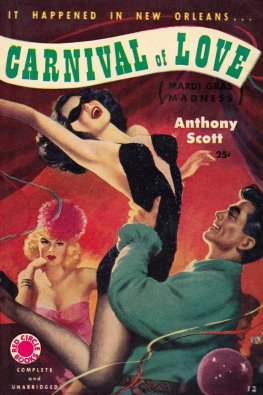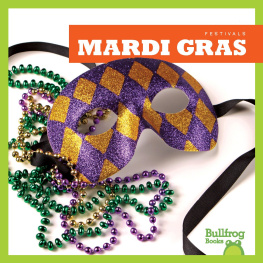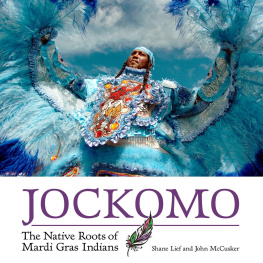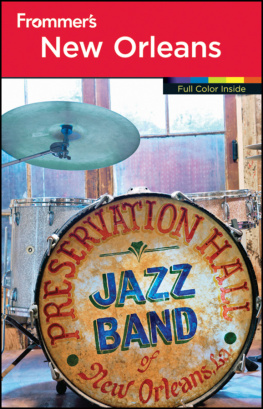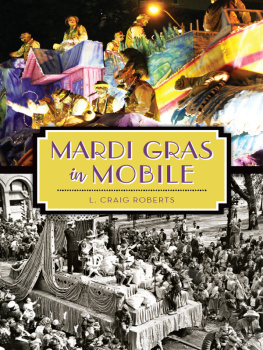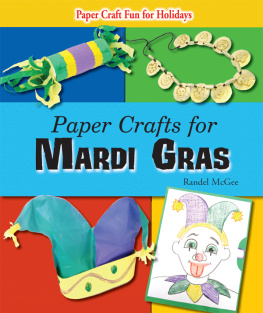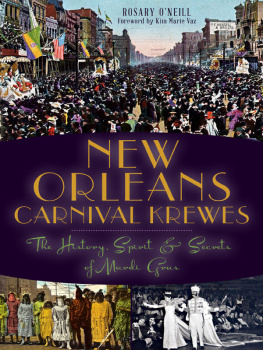PELICAN PUBLISHING COMPANY
Gretna 2018
Copyright 2018
By Al Kennedy
All rights reserved
The word Pelican and the depiction of a pelican are
trademarks of Pelican Publishing Company, Inc., and are
registered in the U.S. Patent and Trademark Office.
ISBN: 9781455623792
Ebook ISBN: 9781455623808
Printed in the United States of America
Published by Pelican Publishing Company, Inc.
1000 Burmaster Street, Gretna, Louisiana 70053
www.pelicanpub.com
To
Eddie and June and Ben and June
and
Isaac Mr. Ike Edward,
whose recollections helped shape this story
Contents
Introduction 9
Chapter 1 Childhood 15
Chapter 2 Brother Tillman 33
Chapter 3 Brother Tillmans Spy Boy 53
Chapter 4 White Eagles 71
Chapter 5 Chief of Chiefs 97
Chapter 6 A Leader in the Community 123
Epilogue Georgia Holloway Lee 159
Afterword 163
Special Photograph Credits 167
Acknowledgments 169
Notes 171
Bibliography 193
Index 201
Big Chief Robbe, Robert Nathaniel Lee (left), sits with Big Chief Donald Harrison Sr. (right) in Harrisons Upper Ninth Ward home on August 13, 1998. (Photograph by Al Kennedy)
Introduction
Thats why the present is here, because the past was carried right. The future dwells in the young fellow that remembers the past.
Big Chief Robbe
Robert Nathaniel Lee sat across the dining-room table from me in Big Chief Donald Harrison Sr.s Upper Ninth Ward home in New Orleans. It was August 13, 1998, the day I met the eighty-three-year-old Big Chief known as Robbe, the first Chief to be honored with the title Chief of Chiefs by the New Orleans Mardi Gras Indian Council. Big Chief Robbe was on hand to add his recollections to Big Chief Harrisons life story. This interview and others would become the book Big Chief Harrison and the Mardi Gras Indians.
At the time, I did not realize my good fortune in being introduced to Big Chief Robbe, and I never expected a close friendship to develop.
Later, when I called Big Chief Robbe, it was not to discuss his long history in the Mardi Gras Indian tradition but rather to ask a very different question. Mr. Lee had lost his sight several years before I met him. Now living with his sister in New Orleans East, far from his familiar Uptown neighborhood, the once fiercely independent and ever-active Chief of Chiefs had no choice but to depend upon others; yet, he embodied serenity and joy. I started out wanting to know how he came to accept the loss of his sight and the other limitations of age and infirmity. I ended up learning about his strong spirit and the contentment that came from his deep spirituality.
He chose to defy the limitations of his blindness. To be blind means you lost something, not everything, he explained. I just dont believe a person is supposed to give in to something bad, and losing your sight sure isnt good.
Robert Nathaniel Lee, born May 21, 1915, had watched the elders since he was a little boy. Eyes wide open, curious, and focused, he learned from those who would have been born in the late 1800s. The more we spoke, the more I grew to appreciate Mr. Lees reputation for integrity. He carefully differentiated between what he had observed and hearsay. When asked a question about something he had not personally witnessed, he might preface his remarks with, This is I hear; its not I know.
If I dont know about it, youre not going to hear it from me, he said more than once.
On occasion he would start to say something, catch himself, pause, and say, Im not going to say that. I could only conclude that there were some memories entrusted to him by the elders that he did not wish to reveal, thereby keeping the secrets of a secret society.
At our first meeting, he clarified the spelling of the nickname he had been called for most of his life. Would I spell it as R-o-b-b-i-e? I asked. No, he replied. R-o-b-b-e. That settled it. Thats how he will be known in the pages of this book.
Robbe was a man who could be believed. His reputation was meaningless if any part of it was built upon a lie. To that end I tried to ensure that I set down his words as he wanted.
Some of this material first appeared in Big Chief Harrison and the Mardi Gras Indians, and those instances are cited. However, since the focus is now on Big Chief Robbe, his quotations in Big Chief Harrison have been expanded with comments gleaned from other interviews that I conducted. The notes reflect this.
On several occasions prior to Robbes death, I had the opportunity to craft the Chief of Chiefs words into public statements and press releases. In each instance, I would first read the edited remarks to him for his approval. I also read to him parts of the corrected transcripts of our interviews. He approved them as well. It was in that context that I edited his comments for this manuscript.
When Big Chief Robbe discussed the same topics on different occasions, I combined his comments, uttered at different times, into single paragraphs so that his narrative would flow more naturally. To that end, I have eliminated the traditional ellipses for material omitted from our conversations. Rather than produce a lengthy list of footnotes on every page, I provided at the end of the book a complete listing of all the interviews and conversations that became the building blocks for this narrative; otherwise, more than four hundred footnotes would have been added to the text. I have tried to capture Big Chief Robbes spirit and his voice, and this story is told in his voice as much as possible.
Robbe used the terms gang and tribe interchangeably when describing the group of men who come together to follow a Big Chief in the masking tradition. Therefore, both terms appear throughout the book.
Big Chief Robbe died on January 19, 2001. In the years since his death, he has never left my mind and heart. There have been times when, at a distance, I spotted a man slight of stature, head held high, walking with the assistance of a cane, maintaining a posture that suggested pride and purpose. Without thinking, I would almost call out to Big Chief Robbe, and then I would remember. With a pang of guilt, I had to admit to myself that the notes about his life I began compiling in 1998 still gathered dust.
Big Chief Robbe deserves to have his story told, at long last.


